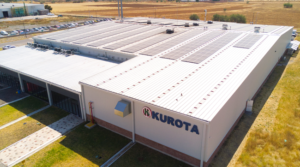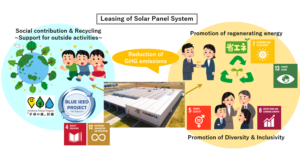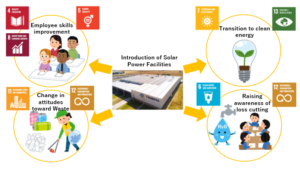Contribution towards SDGs through JCM Model Projects(BOT Lease Co., Ltd.)
Selected Year: 2023
Host Country: Mexico
Project Title: Introduction of 0.5MW Rooftop Solar Power System to Automotive Parts Factory (JCM Eco Lease Scheme)
Representative Participant: BOT Lease Co., Ltd.
Partner Participant: KUROTA MEXICO, S.A. DE C.V. ; BOT FINANCE MEXICO, S.A. DE C.V., SOFOM, E.N.R.
(Project Information URL)https://gec.jp/jcm/projects/23pro_mex_01/

▲PV Panels installed on Rooftop of KUROTA MEXICO Factory
Project Overview
The first JCM Eco-Lease Project in Mexico
This project is to install a 0.5MW solar power generation system on the roof of an automotive parts factory KUROTA MEXICO, S.A. DE C.V. (hereinafter referred to as KUROTA) located in the city of Aguascalientes, central Mexico, through the JCM Eco-Lease Scheme, implemented by BOT Lease Co., Ltd. (hereinafter referred to as BOT Lease). By replacing a part of the electricity consumed in the factory with renewable energy, the project aims to reduce the amount of electricity consumed from the grid and reduce greenhouse gas (GHG) emissions.
BOT FINANCE MEXICO, S.A. de C.V. SOFOM E.N.R., which is one of group companies of representative participant, has entered into a sale-and-lease-back agreement with the KUROTA MEXICO, S.A. DE C.V. and provided the finance leasing.
The area around Aguascalientes is home to many Japanese companies, particularly those in the automotive industry, and KUROTA is one of them. The company produces and assembles aluminium brake components and engine parts for automobiles. Its headquarters primarily focuses on developing new products and manufacturing high-value-added components, while the Mexico factory manufactures brake master cylinder pistons for the North American market, conducting integrated production from cold forging to machining, grinding, and anodising. The products are exported to Mexico, the United States, Brazil, and other countries. KUROTA’s factory is located in the Parque Industrial San Francisco IV industrial park in Aguascalientes, where many Japanese automotive-related companies have factories. Nissan Motor also has a factory in Aguascalientes and exports to North America.
Efforts of BOT Lease, the Representative Participant
【Initiatives related to SDGs】
BOT Lease Co., Ltd. (hereinafter referred to as ‘BOT Lease’) implements the following initiatives related to environment, labour, social contribution, and recycling activities.
1.Environment
BOT Lease has identified ‘Climate Change Response and Environmental Conservation – Achieving Carbon Neutrality’ as a key priority. Under this policy, BOT Lease promotes initiatives related to renewable energy and energy-efficient and fuel-efficient properties, aiming to achieve a decarbonised society. Additionally, starting in the 2023 fiscal year, target amounts for initiatives related to sustainable finance have been disclosed on their website (domestic initiatives only). The JCM Eco-Lease project also serves as a clear example of their efforts overseas, making it a significant appeal.
2.Labour
BOT Lease has established internal systems to promote diversity and inclusion. For employees in Japan, e-learning on codes of conduct and other topics in accordance with MUFG rules, as well as training by external lecturers are conducted regularly. (e.g., study sessions on renewable energy).
3.Social contribution
BOT Lease donates the proceeds from the re-lease agreement to the ‘Children’s Forest project’ implemented by the International NGO (OISCA: The Organization for Industrial, Spiritual and Cultural Advancement-International). This project aims to support tree planting activities and environmental education in the Asia-Pacific region, with the goal of fostering a love of nature in future generations.
4.Recycling activities
BOT Lease participates in the ‘BLUE SEED PROJECT’ to collect empty disposable contact lens cases. This project is an initiative to address the problem of plastic waste by recycling the collected cases, with the proceeds donated to marine litter prevention efforts.

【Benefits for businesses and beneficiaries resulting from SDG initiatives】
As the first JCM Eco-Lease project in Mexico, BOT Lease had an opportunity to introduce this project at the JCM seminar held in Mexico in November 2022. This has led to an increase in inquiries about the subsidy programme for the JCM facility introduction not only in Mexico and Japan but also in other JCM partner countries such as Indonesia, the Philippines, and Thailand. (Inquiries have come from seminar attendees and major Japanese machinery manufacturers, among others.)
- The increase in inquiries has helped raise awareness among employees and national staff stationed overseas about SDGs initiatives.
- BOT Lease provides training opportunities in Japan for national staff overseas every year. In the 2024 fiscal year, a two-hour training session on ESG/SDGs was conducted. Participants showed a high level of interest and listened attentively.
- Additionally, through this project, we have established support from companies with which we previously had limited contact, fostering positive relationships. These partnerships now extend beyond Mexico to Japan and ASEAN countries, where we are collaborating in SDG promotion initiatives at each other’s overseas offices.
【Challenges in implementing SDG-related activities】
It is challenging to balance the core business of a leasing company—finance (short-term revenue)—with achieving SDGs. While some customers understand the importance of decarbonisation efforts associated with capital investments, there is a dilemma in that these efforts do not necessarily translate into pricing strategies. Therefore, we are considering leveraging subsidy programmes, but the variety of such programmes makes it difficult to fully understand them, which is another challenge.
Regarding the subsidy programme for the JCM facility introduction, the use for technologies other than solar power is perceived as having complex methodologies and high barriers to entry. However, we are exploring the possibility of collaborating with external partners to explore methodologies for technologies other than solar power.
Efforts of KUROTA MEXICO, a Partner Participant

▲KUROTA MEXICO Factory PV Panel Installation Overview
【Motivation and background for taking on the SDGs】
Born out of corporate activities aimed at eliminating waste
‘In the manufacturing industry, we have always conducted business activities with a mind of “loss reduction,” and the movement to “eliminate loss = cut costs” aligns with efforts to preserve the global environment, leading to the introduction of this new facility,’ said Mr. Sugai, the local president and CEO. KUROTA’s SDGs initiatives are led by the headquarters (KUROTA SEIKI SEISAKUSHO CO., LTD.), but the efforts to eliminate waste that have been carried out at the headquarters have also contributed to environmental conservation and have become part of the company’s corporate philosophy. This is a good example of how contribution to the SDGs can be achieved through core business activities.
【Initiatives related to SDGs in this project】
Transition to clean energy and employee awareness reform
- By generating electricity using rooftop solar power facility and consuming it within the factory, the amount of electricity purchased from fossil fuel-based grids is reduced, promoting the transition to clean energy.
- Contributing to raising employee awareness of the importance of not wasting electricity.
In addition, as a unique initiative at the Mexico factory, President Sugai is challenging himself to implement waste separation. In Mexico, there is no separate collection of general waste, so employees’ awareness of waste separation is low, and empty cans and bottles are disposed of together with combustible waste in household waste. Although there are plastic recycling companies, they are unable to keep up with the rapidly increasing amount of plastic waste. In response, KUROTA has begun activities to instill awareness of waste separation among employees within the factory. Initially, employees had low awareness, but upon learning that sorted empty cans and bottles are purchased, they have begun to realise that their efforts are ‘valuable.’ Producing defective products in the factory wastes resources. Similarly, by sorting recyclable waste, resources can be utilised effectively. Through such activities, the company aims to continue fostering a cultural shift in employees’ awareness.
【Benefits for businesses and beneficiaries resulting from SDG initiatives】
Changes in water consumption due to loss prevention awareness and increased employee motivation
At KUROTA, a significant challenge was how to reduce the amount of water used for product cleaning, as surface treatment requires large amounts of water. ‘We discovered that shower cleaning was operating even when products were not being processed on the factory line, so we immediately introduced product detection sensors and achieved a 15% reduction in water usage.’ This is an example of how awareness of the importance of using valuable resources effectively has been further heightened among employees.
At KUROTA, they had been conducting new employee training, but for the core aspects of the business, they had been hiring supervisors from Japan to provide training. During the pandemic when travel was restricted, they occasionally conducted training via web conferencing with Japan, but when led by Japanese staff, this did not contribute to the growth of Mexican staff. Currently, they are focusing on challenging employees to take on tasks that contribute to their skill development, such as programming. When employees show interest, it leads to further learning. They also send a few employees at a time to Japan for skill enhancement opportunities at the headquarters or training institutions, which further fosters their motivation to improve.
Regarding gender balance at KUROTA, approximately 60% of the 230 employees are women. Given that the company manufactures aluminium automotive brake parts, which require highly detailed work, women are said to be well suited to the job. There are seven managers, two of whom are women.
【Comment on Subsidy Programme for the JCM Facility Introduction】
In Japan, we have utilised various subsidy programmes in the past, but we always had to prepare the paperwork ourselves. However, since this was a leasing case, all the paperwork was prepared by BOT Lease, so I think the barriers to utilising the subsidy were lower.

